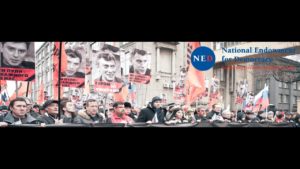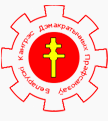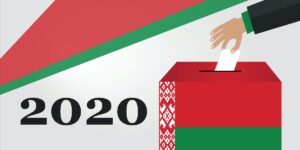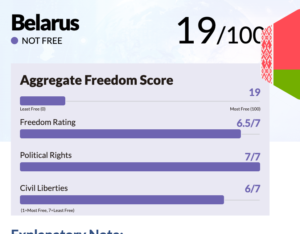Did you miss this week’s discussion about the presidential election and protests in Belarus? (Ft @McFaul @AnnaGBusse @kath_stoner @FukuyamaFrancis). Watch on YouTube 👀: https://t.co/IMTgD2QC6x pic.twitter.com/ObR8llwY5B
— FSI Stanford (@FSIStanford) August 20, 2020
The unprecedented pro-democracy protests that have swept Belarus since a deeply flawed election, are not the equivalent of Ukraine’s 2014 Maidan protests, which had a strong pro-Western edge, experts suggest.
With dictator Alexander Lukashenka stripped of all legitimacy, only international mediation can help resolve the crisis, argues ACUS analyst Anders Aslund.
 In terms of international relations, a major development this week was the Lithuanian parliament’s decision not to recognize Lukashenko as the legitimate president of Belarus, says Sławomir Sierakowski, founder of the Krytyka Polityczna movement. For its part, Russia has not been eager to intervene. Previous democratic transformations in Armenia, Moldova, and Georgia have already shown that Russia can secure favorably inclined post-dictatorships within its sphere of influence at no cost. Continuing with Lukashenko in power, however, will only guarantee more trouble for the Kremlin, he writes for Project Syndicate.
In terms of international relations, a major development this week was the Lithuanian parliament’s decision not to recognize Lukashenko as the legitimate president of Belarus, says Sławomir Sierakowski, founder of the Krytyka Polityczna movement. For its part, Russia has not been eager to intervene. Previous democratic transformations in Armenia, Moldova, and Georgia have already shown that Russia can secure favorably inclined post-dictatorships within its sphere of influence at no cost. Continuing with Lukashenko in power, however, will only guarantee more trouble for the Kremlin, he writes for Project Syndicate.
 Putin could send his military into Belarus — but it’s a risky option. A new military escapade at the center of Europe could mean both a public backlash in Russia and even stricter sanctions from the world’s democracies. Contradicting Lukashenko’s previous announcement that Putin has offered “security assistance,” a Kremlin spokesman said “there’s currently no such need,” notes Vladimir Kara-Murza, the chairman of the Boris Nemtsov Foundation for Freedom and vice president of the Free Russia Foundation.
Putin could send his military into Belarus — but it’s a risky option. A new military escapade at the center of Europe could mean both a public backlash in Russia and even stricter sanctions from the world’s democracies. Contradicting Lukashenko’s previous announcement that Putin has offered “security assistance,” a Kremlin spokesman said “there’s currently no such need,” notes Vladimir Kara-Murza, the chairman of the Boris Nemtsov Foundation for Freedom and vice president of the Free Russia Foundation.
As often with anti-authoritarian uprisings, international opinion matters. There have been encouragingly strong statements on non-recognition of Lukashenko’s “election” from both sides of the Atlantic, notably from the European Union, Canada and Britain. This position must hold firm — both for Belarus today, and as a precedent for Russia in 2024 if Putin runs again in violation of the term limit, he writes for The Post.
 Workers across the country have taken a stand against violence and injustice. But the workers’ movement in Belarus is not a monolith, adds the vice chair of the Belarusian Congress of Democratic Trade Unions, part of the International Trade Union Confederation that brings together the country’s independent trade unions. All these independent unions, with a membership of about 10,000 people, are on strike, he writes for The Times:
Workers across the country have taken a stand against violence and injustice. But the workers’ movement in Belarus is not a monolith, adds the vice chair of the Belarusian Congress of Democratic Trade Unions, part of the International Trade Union Confederation that brings together the country’s independent trade unions. All these independent unions, with a membership of about 10,000 people, are on strike, he writes for The Times:
Then there’s the “official” Federation of Trade Unions of Belarus, which claims to represent 96 percent of workers, about 4.5 million people. (The figure is grossly inflated.) This entity is not internationally recognized and its head is also the head of Mr. Lukashenko’s presidential campaign. Still, there are good people in the organization, even if those at the top still support Mr. Lukashenko. Dissent is emerging here, too; in large factories, workers are leaving the “official” union and joining our ranks.

FPRI
But survey evidence suggests that Ukraine’s 2014 Maidan protests, which had a strong pro-Western edge, do not inspire Belarusians. Rather, the scenario in Belarus reflects dissatisfaction with Lukashenko’s 26-year dictatorial rule, according to Virginia Tech’s Gerard Toal, the University of Colorado’s John O’Loughlin, and University College London’s Kristin M. Bakke.
What our research reveals is fairly consistent with what academic research reveals about Belarus. Belarusians have their own distinctive sense of identity, and also important internal differences, especially generational, over the past, present and future. Belarus is nobody’s client state. While remaining culturally close to Russia, the country remains open to the West but does not want to join NATO. Discontent has been building for some time and different constituencies are now aroused in opposition to Lukashenko — but what happens next remains an open question, they write for The Post’s Monkey Cage blog.
 The United States, EU, and United Kingdom (which has announced its intention to use sanctions in response to the violent crackdown in Belarus) should immediately prepare economic sanctions options to be launched should Putin invade Belarus directly or via the deployment of little green men. As the West did with Ukraine, they should make clear to the Kremlin that these options exist, and so does the political will to use them, add NED board member Daniel Fried and Brian O’Toole, a Distinguished Fellow and Nonresident Senior Fellow, respectively, at the Atlantic Council:
The United States, EU, and United Kingdom (which has announced its intention to use sanctions in response to the violent crackdown in Belarus) should immediately prepare economic sanctions options to be launched should Putin invade Belarus directly or via the deployment of little green men. As the West did with Ukraine, they should make clear to the Kremlin that these options exist, and so does the political will to use them, add NED board member Daniel Fried and Brian O’Toole, a Distinguished Fellow and Nonresident Senior Fellow, respectively, at the Atlantic Council:
Such sanctions could include intensification of sanctions against the Russian financial sector; intensification of energy technology sanctions; and intensified restrictions on exports to Russia of military, dual-use, or other cyber technology, including by reestablishment of an allied coordination mechanism to manage these over the longer-term.
Sending a strong message now, before Putin has committed himself to a violent course of action, might head it off by disabusing Putin of the notion that the West is so divided and distracted he can attack another neighbor with impunity. RTWT
Lukashenko’s Ceauşescu Moment? by @NEDemocracy fellow @sieraKP @ProSyn https://t.co/80V0oZuRfD
— Democracy Digest (@demdigest) August 21, 2020







